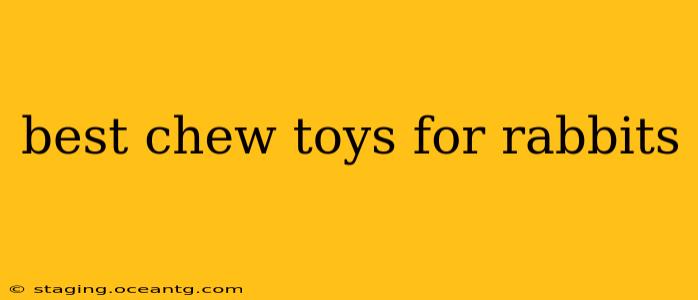Rabbits are naturally inquisitive creatures with a constant need to chew. Chewing is essential for their dental health, preventing overgrown teeth that can lead to serious health problems. Providing your bunny with a variety of safe and stimulating chew toys is crucial for their well-being. But with so many options available, choosing the best chew toys for rabbits can be overwhelming. This comprehensive guide will help you navigate the world of rabbit chew toys, ensuring your furry friend has everything they need to keep their teeth healthy and their minds engaged.
What Makes a Good Rabbit Chew Toy?
Before diving into specific recommendations, let's establish the key characteristics of a superior rabbit chew toy:
- Safety: The material must be non-toxic and durable enough to withstand vigorous chewing. Avoid anything that could splinter, break apart into small pieces (choking hazard), or contain harmful dyes or chemicals.
- Durability: Rabbits have powerful jaws! Choose toys that can endure their chewing power, lasting for a reasonable amount of time.
- Stimulation: The best toys are engaging and encourage natural behaviors like gnawing, foraging, and playing.
- Variety: Offer a range of textures and materials to keep your rabbit interested and prevent boredom.
- Size Appropriateness: Ensure the toy is appropriately sized for your rabbit to avoid choking hazards or frustration.
Types of Chew Toys for Rabbits
Several excellent options provide different textures and levels of stimulation.
Hay-Based Toys:
These are excellent for dental health and also provide essential fiber. Look for toys that securely hold hay and encourage your rabbit to work for their food, promoting natural foraging behaviors.
Wooden Chew Toys:
Untreated, hardwood toys are a great choice. Avoid softwoods like pine or cedar, as they contain oils that can be harmful to rabbits. Apple wood, willow, and birch are popular and safe options. Look for toys in various shapes and sizes for added interest.
Cardboard Chew Toys:
Cardboard tubes, boxes (ensure they're not treated with inks or chemicals), and other cardboard items are inexpensive and readily available. Supervise your rabbit while they are chewing cardboard to ensure they don't ingest large pieces.
Vegetable-Based Chew Toys:
Many vegetables are safe and enjoyable for rabbits to chew on. These should be considered treats and not a replacement for the other toy types mentioned above. Examples include:
- Carrot tops
- Parsley stems
- Celery
H2: What are some safe materials for rabbit chew toys?
Safe materials for rabbit chew toys include:
- Untreated hardwood: Applewood, willow, birch are excellent choices. Avoid softwoods.
- Hay: Timothy hay, oat hay are great for dental health and fiber.
- Cardboard: Untreated cardboard is safe, but supervise your rabbit to prevent ingestion of large pieces.
- Sisal: A strong natural fiber often used in rope toys.
H2: What materials should I avoid for rabbit chew toys?
Avoid these materials for rabbit chew toys:
- Softwoods (pine, cedar): These contain oils that are toxic to rabbits.
- Plastics: Can splinter and are not digestible.
- Treated wood: Chemicals used in treatment can be harmful.
- Rubber: Many rubbers contain harmful chemicals.
- Anything painted or dyed: The dyes can be toxic.
H2: How often should I replace my rabbit's chew toys?
Replace chew toys as soon as they show significant wear and tear to prevent ingestion of dangerous fragments. Also, regularly rotate toys to keep your rabbit engaged and prevent boredom.
H2: My rabbit is not interested in their chew toys, what should I do?
If your rabbit isn't interested in their chew toys, try:
- Introducing new toys regularly: Variety is key.
- Offering different textures and materials: Experiment to find what your rabbit prefers.
- Freezing treats into a toy: This can make the toy more enticing.
- Making toys from household items: Cardboard boxes and tubes are easy and cheap to provide.
- Consulting your veterinarian: There might be an underlying dental or health issue.
By providing your rabbit with a variety of safe and engaging chew toys, you can contribute significantly to their overall health, happiness, and well-being. Remember to always supervise your rabbit during playtime and regularly inspect their toys for signs of damage.
